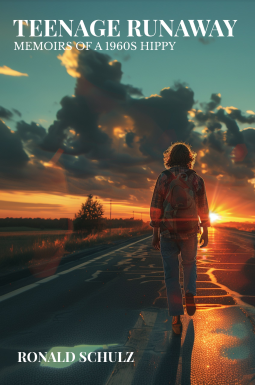
Teenage Runaway
Memoirs of a 1960s Hippy
by Ronald Schulz
This title was previously available on NetGalley and is now archived.
Send NetGalley books directly to your Kindle or Kindle app
1
To read on a Kindle or Kindle app, please add kindle@netgalley.com as an approved email address to receive files in your Amazon account. Click here for step-by-step instructions.
2
Also find your Kindle email address within your Amazon account, and enter it here.
Pub Date Jul 01 2025 | Archive Date Jun 22 2025
DAOwen Publications | Tumbleweed Books
Talking about this book? Use #TeenageRunaway #NetGalley. More hashtag tips!
Description
One boy. One backpack. One shot at freedom.
In 1967, fifteen-year-old Ronald Schulz packed HIS bag, left a note on his dresser, and walked away from everything he knew–Family, friends, home, and life as he knew it.
Teenage Runaway–a gripping true story of rebellion, survival, and the desperate search for identity during one of America’s most explosive decades. Faced with bullies, broken family dynamics, and a school system that crushes individuality, Schulz chose the open road over obedience–and found a world far more dangerous and transformative than imaginable.
Raw, honest, and unforgettable, this memoir captures the spirit of a lost generation–and the high cost of finding your own way.
Perfect for fans of coming-of-age memoirs, counterculture history, and stories of real-life escape.
Available Editions
| EDITION | Ebook |
| ISBN | 9781998029303 |
| PRICE | CA$6.99 (CAD) |
| PAGES | 222 |
Links
Available on NetGalley
Average rating from 1 member
Featured Reviews
Book Review: Teenage Runaway: Memoirs of a 1960s Hippy by Ronald Schulz
Overview
Ronald Schulz’s Teenage Runaway is a visceral memoir that immerses readers in the turbulent 1960s through the eyes of a fifteen-year-old fugitive from conformity. Fleeing an oppressive home life, bullying, and a rigid school system in 1967, Schulz’s journey—equal parts rebellion and self-discovery—captures the era’s countercultural zeitgeist with unflinching honesty. Structured as a 45-chapter odyssey, the narrative spans two transformative years, from high school disillusionment to the haunting return of a Vietnam War casualty, his former tormentor. Schulz’s prose is raw and evocative, making this a standout in coming-of-age literature and counterculture history.
Key Themes and Strengths
-A Lost Generation’s Portrait: Schulz’s memoir transcends personal narrative, embodying the disillusionment of 1960s youth. His encounters with homelessness, hitchhiking dangers, and makeshift hippie communities reveal the era’s stark contrasts—idealism versus survival.
-Identity and Trauma: The author’s search for autonomy is punctuated by poignant reflections on bullying, familial estrangement, and the psychological scars of war (e.g., the symbolic return of “Big John”). These themes resonate with modern discussions on mental health and systemic oppression.
-Historical Authenticity: Schulz’s vivid recollections of anti-establishment havens, psychedelic experimentation, and political unrest offer scholars a grassroots perspective on counterculture movements.
-Narrative Craft: The memoir’s episodic structure—each chapter a vignette of defiance or despair—mirrors the fragmented lives of runaways. Schulz’s candid voice avoids romanticization, underscoring the “high cost” of freedom.
Critique
While Schulz’s storytelling is gripping, some readers may crave deeper sociological analysis or postscript reflections on how his experiences shaped his later life. The memoir’s strength, however, lies in its unpolished immediacy.
How I would describe this book:
- A raw, riveting time capsule—Schulz’s journey is the 1960s unfiltered.
- For fans of On the Road and Educated—a runaway’s tale that will haunt and inspire.
- The Catcher in the Rye of counterculture memoirs—with real stakes and real scars.
Acknowledgments
Thank you to DAOwen Publications | Tumbleweed Books for the advance review copy. Schulz’s memoir is a vital addition to the canon of 1960s narratives, and I appreciate the opportunity to engage with this unvarnished testament to resilience.
Final Recommendation
Teenage Runaway is indispensable for historians of 20th-century America, educators exploring youth dissent, and readers drawn to transformative survival stories. Schulz’s memoir doesn’t just recount history—it forces you to feel it.
Rating: ★★★★☆ (4/5)
Academic relevance: Ideal for courses in American studies, social history, and narrative nonfiction.



